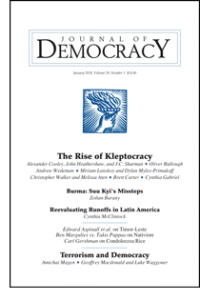 Condoleezza Rice remains optimistic about the future of democracy. The former U.S. national security advisor (2001–2005) and secretary of state (2005–2009) believes that pessimists today make the mistake of expecting democracy’s march to be “linear”; the fail to recognize that, despite the recent democratic “recession,” the overall trajectory of “third wave” progress in Latin America, Africa, Asia, and Central Europe “is worth celebrating, the National Endowment for Democracy’s Carl Gershman notes:
Condoleezza Rice remains optimistic about the future of democracy. The former U.S. national security advisor (2001–2005) and secretary of state (2005–2009) believes that pessimists today make the mistake of expecting democracy’s march to be “linear”; the fail to recognize that, despite the recent democratic “recession,” the overall trajectory of “third wave” progress in Latin America, Africa, Asia, and Central Europe “is worth celebrating, the National Endowment for Democracy’s Carl Gershman notes:
She also rejects the idea that China offers a successful authoritarian alternative, arguing that its “top-down model of economic growth has run out of steam” (389). Besides, China faces many other systemic crises, from “a horrible demographic problem” and “a pollution nightmare” to pervasive corruption that the government has been unable to control despite a harsh crackdown. She believes that India has a much better chance to bring its “endemic corruption” under control because it has democratic institutions to keep authorities in check and assertive citizens who are demanding governmental accountability. Democracies are often less efficient, she writes, “but they may ultimately be more effective and resilient” (401).
 Rice is hopeful about democracy, but her book’s central message is that its future will be imperiled unless Americans can overcome their “crisis of confidence about our own democracy—who we are and what we value” (435). For that to happen, she argues, three things will need to occur, Gershman writes in a review of her Democracy: Stories from the Long Road to Freedom for the Journal of Democracy:
Rice is hopeful about democracy, but her book’s central message is that its future will be imperiled unless Americans can overcome their “crisis of confidence about our own democracy—who we are and what we value” (435). For that to happen, she argues, three things will need to occur, Gershman writes in a review of her Democracy: Stories from the Long Road to Freedom for the Journal of Democracy:
- First, “the standard-bearers for those who voted to shake up the system [will] need to find the humility to know and accept democracy’s paradox”—namely, that while democracy’s genius is openness to change, its stability depends upon institutional constraints. ….
- Second, her message to defenders of the existing global order is that they will need to become much more sensitive to the problems of Americans who feel threatened economically and culturally by globalization and the erosion of traditional values. …
- Stating the American idea in this way conveys its universality: “This cannot be true for us and not for them” (434). It thus imposes a moral obligation on the United States to give “voice to the voiceless,” which it can do only if it first rebuilds a consensus at home on its international role and responsibilities. This is Rice’s third aim. While the purpose of her book is not to propose a new U.S. foreign policy, she does provide [End Page 172] the core elements of one: to defend the nation’s security, to assist those who are trying to build free societies, and to maintain and form alliances that promote a stable world order.







